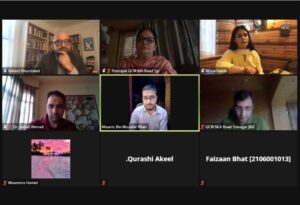Raheel Khursheed talks about positives and perils of social media

Government College for Women, M.A. Road, Srinagar hosted an online session with journalist-turned-tech entrepreneur, Mr. Raheel Khursheed as guest speaker on June 17, 2021. The webinar- first of the 2021 series being organized by Internal Quality Assurance Cell of the college- was attended by students and faculty.
Raheel is the co-founder of Laminar, a streaming/video infrastructure platform. Earlier, he was most notably associated with Twitter India in a senior executive role. He has also been associated with Snap, Charnge.org and Anthro.ai. Raheel has worked extensively in the news media sector with reputed outlets like Vice, PBS, ProPublica, BBC-PRI and CNN-IBN. He was named 2017 Knight Visiting Nieman Fellow at Harvard and a 2018 Draper-Hills Summer Fellow at the Center for Democracy, Development, and the Rule of Law at Stanford University.
Thanking the guest for sparing his time for the webinar despite a busy schedule, Principal, Prof. (Dr.) Yasmeen Ashai spoke about the relevance of the theme ‘Social Media – Opportunities & Challenges’.
“Going by the sheer number, one can easily gauge the popularity and hence the importance of social media. Presently, there are an estimated 400 million social media users in India alone. Facebook remains the most popular choice followed by others like Twitter and Instagram. Of course WhatsApp has become an integral part of our lives. In 2023, the number of Facebook users in India is expected to reach over 444 million, up from 281 million in 2018 indicating an exponential growth in the social media user base,” said Prof. Ashai.
“There has also been a dramatic increase in the risks of misinformation. Fake news seems to spread faster than authentic information and by the time someone puts out a rebuttal or clarification, the damage is done,” Prof. Ashai added.
Stressing on the importance of fact-checking, the Principal said, “We have been hosting series of workshops for journalism students of our college in collaboration with Google News Initiative and Data Leads. The workshops are focused on the tools to monitor online content and train the students in verification strategies to counter fake news.”
In his insightful talk, Raheel touched on the different dimensions of social media- its impact on people’s lives, the opportunities as well challenges associated with an ever changing media and technological landscape.
Raheel shared his experience as a journalist and later as a senior executive at Twitter. Tracing the advances in media technology, from text only content to multimedia, he recalled how as a broadcast journalist he worked with a costlier gear and a big crew and how things have changed to the extent that one can do similar work much cheaper smartphones. He referred to Moore’s Law relating to the speed and capability of computers increasing at a very fast pace.
Stressing on the need to maintain digital hygiene, Raheel said the digital space has become “politicized”. He referred to how even the context of privacy has changed and the “mob mentality” is becoming prevalent on the social media platforms.
“Internet of 2000 was based on the presumption that Internet is a safe, open space. In 2021 it’s not as safe and as open as we hoped it would be. Things can be twisted out of context. People can come after you for your messages. It’s a hungry beast working from one outrage cycle to outrage cycle,” said Raheel.
Since the digital content is archived, he advised students to be careful with what they put out on their social media handles. “People have lost jobs on the basis of what they said four or five years back.”
“We need to be cognizant of how we use technology, what it does to our privacy, our mental health and general well being; the digital trail it leaves,” he added.
Raheel said students need to be updated with the changes in media technologies. He referred to the growing popularity of audio-only platforms. “After the successful launch of Clubhouse in 2020, major social media platforms started working on similar audio-based chat rooms. Twitter has released Spaces inside its app, and Facebook is also working towards introducing a similar feature.”
Raheel also suggested students to think of their online personas, but also take time offline curating meaningful relationships not just mediated by technology only.
The talk was followed by question and answer session with the guest speaker sharing his insight on other issues related to the theme.
The session was moderated by Dr. Abina Habib (Department of English) while Dr. Suhail Ahmad (Department of Journalism) curated the Q&A session. The IQAC team led by Prof. Rashid Ashraf Malik is coordinating the webinar series. The other webinars scheduled include “COVID-19: Vaccine Development & Challenges”, “Reimagining the global environment to avoid tragedy of commons” and “Career Opportunities in Psychology”.


Recent Comments